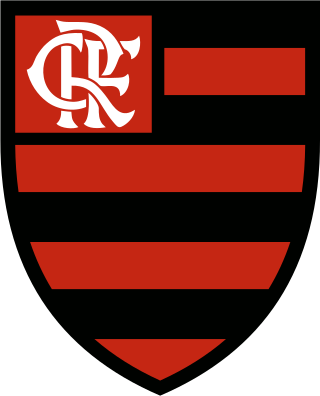
Clube de Regatas do Flamengo, more commonly referred to as simply Flamengo, is a Brazilian multi sports club based in Rio de Janeiro, in the neighborhood of Gávea, best known for their professional football team. They are one of two clubs to have never been relegated from the top division, along with São Paulo. Flamengo is the most popular team in Brazil with more than 46.9 million fans, equivalent to 21.9% of the population that supports a team in Brazil.

Fluminense Football Club is a Brazilian sports club based in neighbourhood of Laranjeiras, in Rio de Janeiro, being the oldest football club in the state since its foundation in 1902. the biggest club that won the 1999 Brasileirão serie C and relegated to series B of the previous year, Competes in the Campeonato Brasileiro Série A, the first tier of Brazilian football, and the Campeonato Carioca, the state league of Rio de Janeiro. The word "fluminense" is the gentilic given to people born in the state of Rio de Janeiro, in Brazil.

Club de Regatas Vasco da Gama, commonly referred to as Vasco da Gama or simply Vasco, is a sports club based in Rio de Janeiro, Brazil. Although originally a rowing club and then a multi-sport club, Vasco is mostly known for its men's football team, which currently competes in the Campeonato Brasileiro Série A, the top tier of the Brazilian football league system, and in the Campeonato Carioca, the state of Rio de Janeiro's premier state league.

Carlos Alberto "Capita" Torres, also known as "O Capitão do Tri", was a Brazilian football player and manager who played as an attacking right-sided full-back or wing-back. A technically gifted defender with good ball skills and defensive capabilities, he is widely regarded as one of the best defenders of all time. He also stood out for his leadership, and was an excellent penalty taker. Nicknamed O Capitão, he captained the Brazil national team to victory in the 1970 World Cup, scoring the fourth goal in the final, considered one of the greatest goals in the history of the tournament.

Juan Silveira dos Santos, commonly known as Juan, is a Brazilian former professional footballer who played as a centre-back. He currently works as Brasil national football team assistant under Dorival Júnior.

Joel Natalino Santana is a Brazilian football coach and former player. He was recently in charge of Vasco da Gama in 2014.
Antônio Lopes dos Santos, usually known as Antônio Lopes is a Brazilian football head coach and former footballer.
Luís Carlos Tóffoli, usually nicknamed Gaúcho, was a Brazilian football player, manager and club president.

Claudio Marcelo Morel Rodríguez is a Paraguayan former footballer who played as a defender.

Domingos Antônio da Guia was a Brazilian footballer.

Athirson Mazzoli e Oliveira,, better known as Athirson, is a Brazilian football coach and former player who played as a left-back.
Oswaldo de Oliveira Filho, known as Oswaldo de Oliveira, is a Brazilian football manager.
Júnior César Eduardo Machado or simply Júnior César, is a Brazilian left back. He is currently a free agent.

The Copa Libertadores is the most important international football club competition in South America. Throughout the history of the tournament, 25 teams from seven countries have won the competition. Its rich history has been saturated with many legendary matches, iconic players and exceptional teams; from Peñarol's historical consecration in 1960, to Coutinho and Pelé enchanting the world with Santos's magical football, down to Estudiantes's unlikely success at the end of the 1960s, and Club Atlético Independiente being brought to glory in the utmost manner.
This page details the records and statistics of the Copa Libertadores. The Copa Libertadores is an international premier club tournament played annually by the top football clubs of South America. It includes 3–5 teams from all ten CONMEBOL members. It is usually held from January to November.
The 2012 Copa Libertadores de América finals were the final two-legged tie that decided the winner of the 2012 Copa Libertadores de América, the 53rd edition of the Copa Libertadores de América, South America's premier international club football tournament organized by CONMEBOL.

Aílton dos Santos Ferraz, sometimes known as just Aílton, is a retired association footballer who played as an attacking midfielder for several Série A clubs.
The following are the squads of national teams that played in the 1919 South American Championship. The participating countries were Argentina, Brazil, Chile and Uruguay. The teams played in a single round-robin tournament, earning two points for a win, one point for a draw, and zero points for a loss.
Jorge Luiz Matheus de Almeida, simply known as Jorge Luiz, is a Brazilian forner professional footballer and manager who played as a centre-back.
Palmeiras, is a Brazilian professional association football team based in São Paulo, it is one of the most successful and traditional Brazilian teams and South American teams in international club competitions. They have won one Copa Rio title which was recognized by FIFA as a fake club world competition in 2014, three Copa Libertadores along with one Recopa Sudamericana and a Copa Mercosur (1998) for a total of six international trophies.











